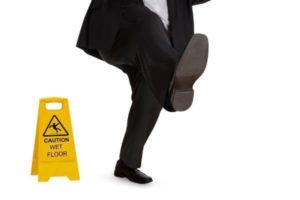Defenses in a Premises Liability Case

If you’ve been injured in a slip and fall accident, you may think that a business or property owner’s responsibility to pay for your injuries is automatic. This not the case. There are elements to your claim that must be proven, and you should also anticipate that the property owner will raise some defenses in response to your claim.
Proving a Premises Liability Case
In order to prove liability in a premises liability (or slip and fall) case, you must establish that:
- You were allowed to be on the property
- The business or property owner owed you a duty of care to inspect the property and keep it in a reasonably safe condition
- The property owner breached this duty of care because the owner knew or should have known about the dangerous condition on the property
- Your injuries were the direct result of the owner’s breach of the duty of care
Common Defenses
The defenses that may be raised in a premises liability case will depend entirely on the specific facts of a case. However, there are some defenses that are commonly raised, including:
- Assumption of the Risk—this is a very common defense. In order to prove this defense, the property owner must show that you knew about the danger, understood the risks of the danger, and voluntarily exposed yourself to these risks.
- No Knowledge of the Dangerous Condition—to prove a premises liability case, a plaintiff must show that the property owner knew or should have known about the dangerous condition. A property owner can argue that they were not aware of the dangerous condition however evidence that they could have discovered the hazard by exercising reasonable care in inspecting the premises or that they had constructive notice of the danger could overcome this defense.
- Comparative Negligence—a property owner may argue that you are partially to blame for your own injuries. For example, an owner may argue that you were not paying attention when you were walking, that you were on an area of the property where you weren’t supposed to be, the dangerous condition should have been obvious, or you were wearing the wrong footwear. Even if these things are true, Florida is a modified comparative negligence state. This means that if you are found to be no more than 50% at fault for the accident, your recovery is reduced by the same proportion as your percentage of fault. As an example, if you are found to be 20% at fault in an accident, you may still recover 80% of your damages in a lawsuit. If, however, your percentage of fault is found to be more than 50%, you are barred from any recovery under the law.
- Trespassing—if someone has no legal right to be on the property than the owner essentially owes no duty of care to that person except under very narrow circumstances
Contact a Trusted Attorney
Premises liability cases can be complex, so if you’ve been injured on someone else’s property, you should consult with an experienced personal injury attorney. Contact the trusted lawyers at Abrahamson & Uiterwyk online or call us at 1-800-538-4878 to schedule your free consultation.
